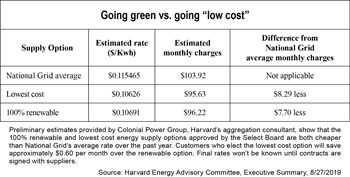The change has been in the works for almost three years, following the vote of Special Town Meeting in October 2016 to authorize the Select Board to enter into agreements for the purchase of electric energy on behalf of the entire town, similar to arrangements, known as Community Choice Aggregation (CCA) plans, enacted in more than 120 other municipalities in the state.
By voting unanimously Tuesday night to choose a supplier of wind-generated renewable energy as the town’s default supplier of electricity, the Select Board completed one of the few remaining steps required to implement a CCA plan for Harvard. The town will also offer a “lowest cost” option that conforms to the Massachusetts Renewable Energy Portfolio Standard, which prescribes how much of a utility’s electricity must come from renewable energy, but is cheaper than the 100% renewable plan. All that remains to be done now is for the town to sign contracts with the suppliers for its two preferred plans, at which time a fixed rate for each plan will be set for the next three years. Town Administrator Tim Bragan was expected to sign the contract this week.
Once the CCA plan takes effect, customers whose source of electricity is National Grid will be switched automatically to the town’s default, 100% renewable supplier. National Grid will remain the distributor, providing the transmission lines and equipment by which electricity is delivered, regardless of source. Customers who prefer the “lowest cost” plan will need to “opt in” to that plan, while customers who wish to remain with National Grid will need to “opt out.” The estimated 375 residents and businesses that have made alternative supply arrangements will be unaffected; if they wish to join Harvard’s CCA, they will need to terminate those contracts and “opt in” to one of Harvard’s two plans. Those who have installed solar panels on their houses or joined a solar garden will still be able to apply their energy credits to their bills.
Lower rates, greener energy
Preliminary price estimates provided this week by the town’s aggregation consultant, Colonial Power Group (CPG) of Marlborough, indicate that both CCA options will be cheaper than current National Grid prices, with savings of $90 to $100 per year. The difference between the 100% renewable and lowest-cost plans was estimated to be only $0.60 per month, or $7 per year (see table).
In addition to its attractive rates, the 100% renewable option reduces Harvard’s carbon footprint, as argued by Harvard Energy Advisory Committee (HEAC) Vice Chair Eric Broadbent in his Consider This column last week (see “Coming soon … better electric supply options,” Aug. 15, 2019). “At 16.5 tons, U.S. per-capita CO2 emissions were more than four times the global average, and more than eight times the level now accepted as a near-term benchmark requirement to avert a runaway climate catastrophe,” he wrote. “By adopting a 100% renewable supply as the default, Harvard’s per-capita greenhouse gas contribution should decrease by more than 1 ton annually, an easy yet significant step toward a more sustainable future.”
The options approved by the Select Board Tuesday night were developed by HEAC members—led by Broadbent—and by Bragan, Assistant Town Administrator Marie Sobalvarro, and CPG. They were also informed by a town survey that was completed by 145 residents. Among its results:
Nearly 9 out of 10 respondents said they preferred more renewable energy in their electricity and of these, more than 75% of respondents asked for a 100% renewable option.
Nearly 75% of respondents said they were willing to pay an extra 1% or more on the supply portion of their bill to have 100% renewable electricity.
Approximately 11% said they already had an alternative supplier.
A minority of highly price-sensitive customers strongly preferred a lowest cost option.
Although the town authorized development of a Community Choice Aggregation plan in 2016, it wasn’t until June last year that the town finally contracted with CPG to draft one. With state’s approval of Harvard’s plan in July, the town was ready to make a decision on whether to implement the plan now or wait for more favorable conditions. This week the CCA team recommended the former and proposed the town sign three-year contracts with its suppliers to guarantee a stable rate for that period. The Select Board agreed.
Once the contracts are signed, residents can expect a CPG-driven publicity blitz, with mailings, emails, and a website to provide residents tools to opt-out or opt-in to the Harvard CCA. Customers happy with the default plan need take no action; they will be switched to it automatically.
The Tuesday night vote—an anticlimax after so many months of work—was followed by applause from the Select Board as well as members of the audience, with thanks and the words “well done” for the CCA team and for Broadbent. “It was a privilege,” he said.

